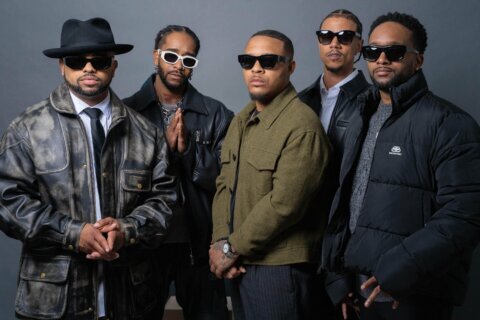Hear our full conversation on my podcast “Beyond the Fame.”
Growing up in Gaithersburg, Maryland, Jared Bush dreamed of one day making movies.
On Sunday night in Los Angeles, he won the Oscar for Best Animated Feature at the 94th annual Academy Awards for writing and directing Disney’s smash hit “Encanto.”
“It’s nerve wracking,” Bush told WTOP. “Sitting there, my heart’s beating out of my chest because you truly don’t know. … When they said it, your heart stops for a second, then you realize I should probably get up there quickly. … You have very limited time to talk.”
This video is no longer available.
After delivering his acceptance speech, Bush headed backstage with his Oscar and missed the entire Will Smith vs. Chris Rock controversy in the auditorium.
“I had no idea,” Bush said. “After you win, you go do a bunch of interviews and pictures. I was back there for an hour, so I had no idea it happened. We got back to our seats and something was different and I was trying to figure out what was going on. My friends were like, ‘You missed something kind of big.’ … I couldn’t wrap my brain around it.”
It’s his second time missing an Oscars controversy after the 2017 envelope gaffe.
“The only time I’ve been to the Oscars prior to this was on ‘Zootopia,'” Bush said. “My friends said, ‘There’s a party after this. We need you to get out really quick and get a place in line,’ so I missed the last 10 minutes the year of Warren Beatty, ‘Moonlight’ and ‘La La Land.’ Whenever I go to the Oscars and leave the room, something major happens.”
Either way, he wouldn’t miss the chance to chat with his hometown radio station.
“WTOP! On my commute in, my parents would be like ‘boop’ [punches dial], always listened to it, it was a morning routine,” Bush said. “Later when I had a job in D.C., my dad would drive me to work and we’d listen to it all the way in, so this is a treat for me.”
What was his favorite Disney movie as a kid in Montgomery County?
“‘The Jungle Book,’ 100%,” Bush said. “It was the first one I remember seeing in the theater, also it’s a musical and I loved the villain, who wanted to eat the main character, who is a child! I was like, ‘I don’t know how you got me to like that character.’ Amazing.”
Soon, he began making his own home movies, including “Hot Cop Part 2.”
“When I was 12, my dad got a video camera,” Bush said. “My brother and my good friends would make home movies all the time. They were all ridiculous. … We shot them around D.C. Several times we were pulled over by the police asking what we were doing, why we were wearing wigs, racing across bridges, tossing bungee-jump dummies over highways.”
He graduated from the inaugural four-year class at Quince Orchard High School in 1992.
“Mr. Angelo, my music teacher, was someone I always looked up to,” Bush said. “The principal at the time, Dr. Warren, was always a good friend. … Mrs. Versel [said], ‘I think English would be good for you.’ … My love of creative writing came out of that. … The right teacher who sees something in you that you don’t see yourself can be a life changer.”
Eventually, he decided to “go west, young man” and move to Los Angeles.
“After college, I was like, ‘I want to move to Hollywood and get into the industry,'” Bush said. “People were like, ‘And do what?’ I was like, ‘I have no idea!’ Luckily, my parents were supportive of this crazy notion like, ‘Follow your dreams, whatever those are.'”
It took him years to slowly work his way up the ladder in Hollywood.
“I started working at a talent agency,” Bush said. “My biggest job was to read scripts and write coverage. … I read hundreds of scripts, which turned out to be the best education. … Shortly after that, I started in television. … I was lucky enough to get hired on a TV show as a writer’s assistant … then I got onto a different show and became a staff writer.”
His big break came at Disney, writing and co-directing the Oscar-winning animated film “Zootopia” (2016), a cleverly subversive social commentary on race in America.
“I bugged and bugged Disney to give me an interview and got hired by Byron Howard, who was working on a movie about animals,” Bush said. “What are those parallels to what we know in our human lives? … The natural ratio of prey to predators is 10 to 1, so 10% predators, 90% prey. … One group is in charge of things and one group is marginalized.”
That same year, Bush also wrote the script for Disney’s “Moana” (2016).
“Ron Clements and John Musker, the most famous Disney directors ever, ‘Little Mermaid,’ ‘Aladdin,’ had been working on it for a while,” Bush said. “‘Moana’ had cast Dwayne Johnson as Maui and Auli’i Cravalho as Moana. … Having specific actors in mind for those voices made a lot of difference. … I love writing fun character back and forth.”
His script wove in hit songs like “How Far I’ll Go” and “You’re Welcome,” written by Broadway icon Lin-Manuel Miranda, with whom he’d reunite on “Encanto” (2021).
“Working with Lin was fantastic; he was like, ‘I want to do something else, something set in Latin America,'” Bush said. “Co-director and co-writer Charise Castro Smith has an encyclopedic knowledge of magical realism and a deep family connection. Her family is Cuban American and emigrated here. … That whole opening core was written by her.”
The opening song, “The Family Madrigal,” packs in tons of character introductions.
“Lin wrote the first song, ‘Family Madrigal,’ for the first screening, knowing it would change 1,000 times before the movie came out,” Bush said. “He gave us a version of, ‘Let’s meet all the characters, here’s what they might sound like.’ … My great joy in life is, early on, I will sometimes write fake lyrics that are really terrible to intentionally mess with Lin.”
One of the film’s catchiest songs remains Luisa’s number “Surface Pressure.”
“We were trying to figure out this character of Luisa,” Bush said. “Early on, he was like, ‘It’s gotta be Reggaeton.’ … When we heard the lyrics, they were actually a much more clear window into Luisa’s issues than we initially thought the song was going to do. As soon as we heard it … we actually went through the entire script and adjusted all of Luisa’s lines.”
Of course, the big pop-culture phenomenon became “We Don’t Talk About Bruno.”
This video is no longer available.
“Every Friday night for two-and-a-half years, we’d get together with Lin,” Bush said. “He goes, ‘It feels like a spooky montuno song.’ He turned from Zoom to his keyboard and wrote it in real time in front of us. … I didn’t have TikTok at the time. … I went on and I couldn’t believe it. It was so exciting because so many found their way into the song.”
Ironically, it wasn’t submitted for the Oscars, instead giving the nod to “Dos Oruguitas.”
“In retrospect … not a thing different,” Bush said. “To hear ‘Dos Oruguitas,’ the emotional core of our story, sung completely in Spanish was important. … The fact that it was the No. 1 album for weeks worldwide is insane! … All of our songs were in the Top 100 Billboard concurrently! … I’m not worried about Lin achieving an EGOT. It’s just a matter of time.”
Beyond the music, “Encanto” features universal themes of generational trauma.
“Our research was our own families,” Bush said. “We hadn’t seen a story that talked about different generations, how one generation affects the next, how we don’t really see each other in our families. We have one view. It’s really hard for me to see my mother as anything other than my mom, but there’s a whole person there, a whole life.”
In other words, try to have empathy for your outcast family members like Bruno.
“That character we had very early on,” Bush said. “There’s a black sheep of the family that is what Mirabel could eventually become if she wasn’t healed and couldn’t make her way through. We needed that character to be there. The specificity of Bruno … got more and more interesting as we went. We found that he’s very funny. John Leguizamo kills it.”
Kids will relate to the main character, Mirabel, as they try to find their place.
“When magical realism in Colombia came into the conversation, ‘Oh man, it could be this family who has these gifts, and what if one member of the family doesn’t have it, how would that feel?'” Bush said. “Many of us look around like, ‘Everyone else has it together, why don’t I?’ But everyone else is dealing with that same thing, we just don’t talk about it.”
What’s his advice to local kids dreaming of a future in Hollywood?
“What I would say to anyone who is interested is — we need new voices,” Bush said. “Your specific voice is really, really important. Much more important than trying to figure out what Hollywood might want is: we want you. We want individual, unique perspectives. That’s critical. If I can be here having this conversation with you, anyone can do that.”
Hear our full conversation on my podcast “Beyond the Fame.”








